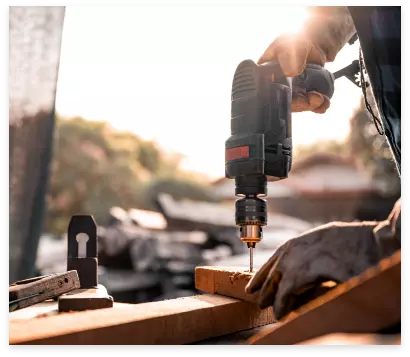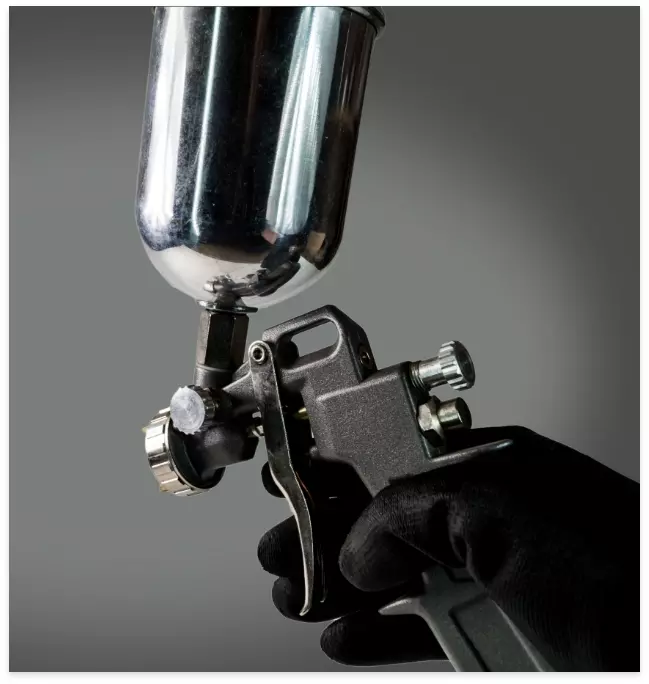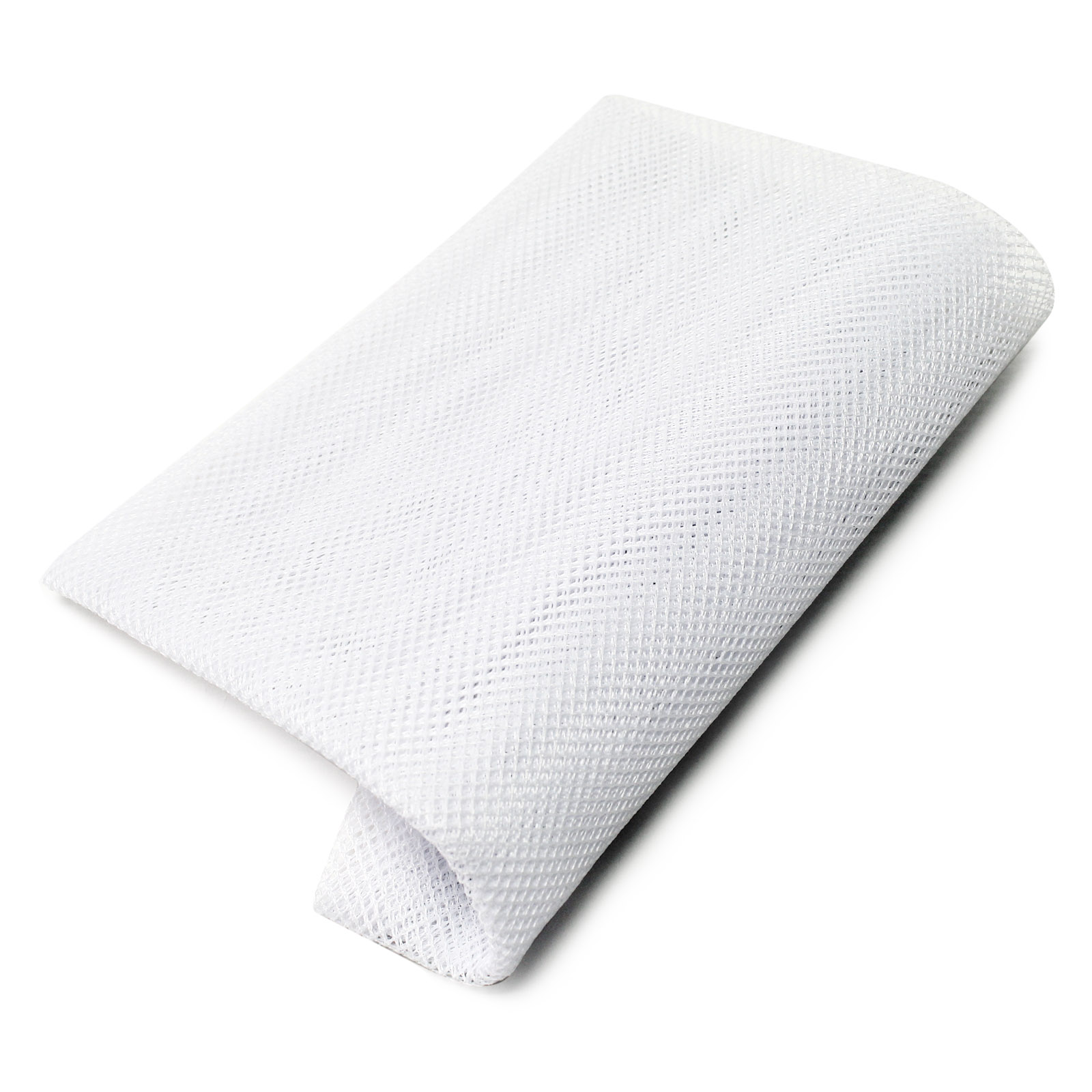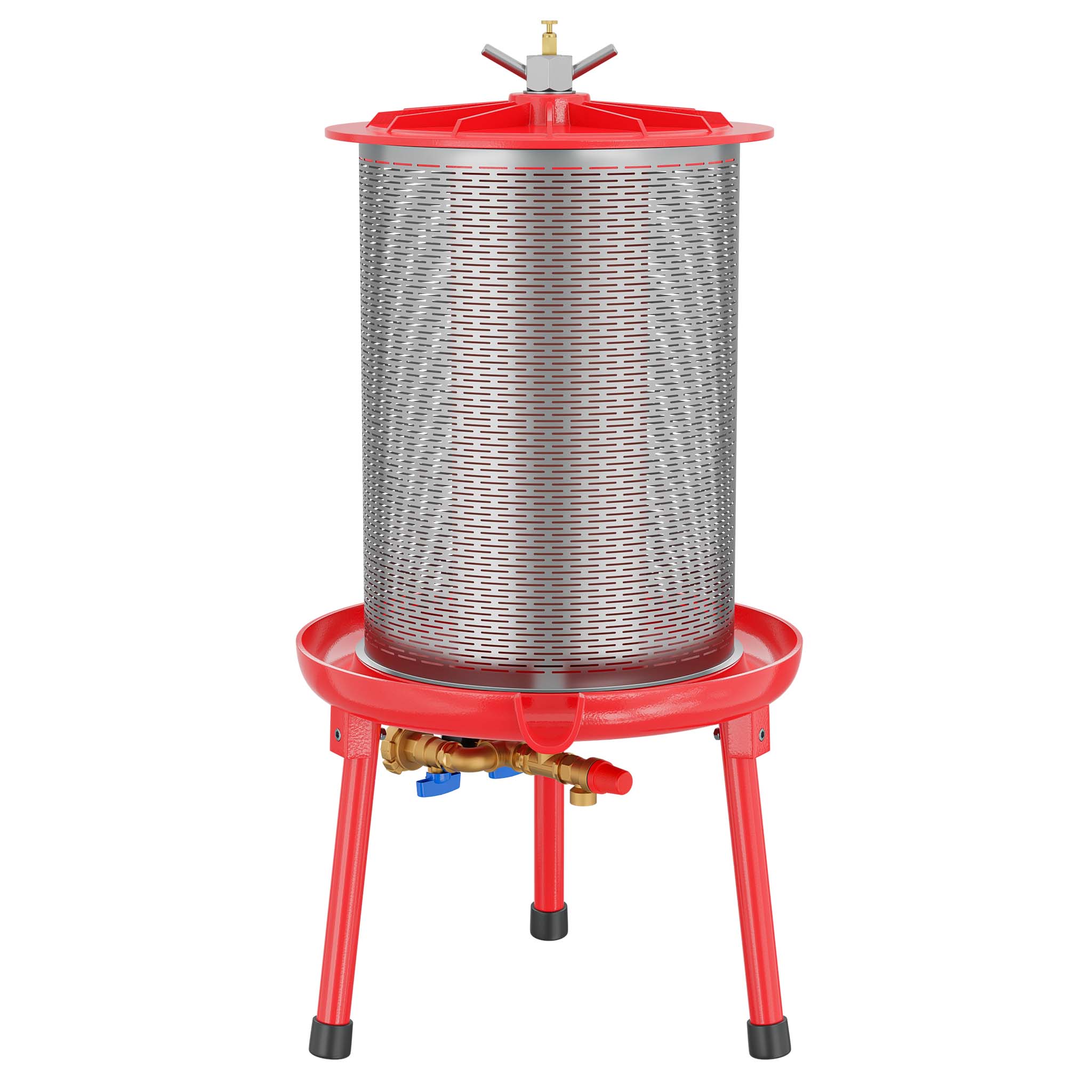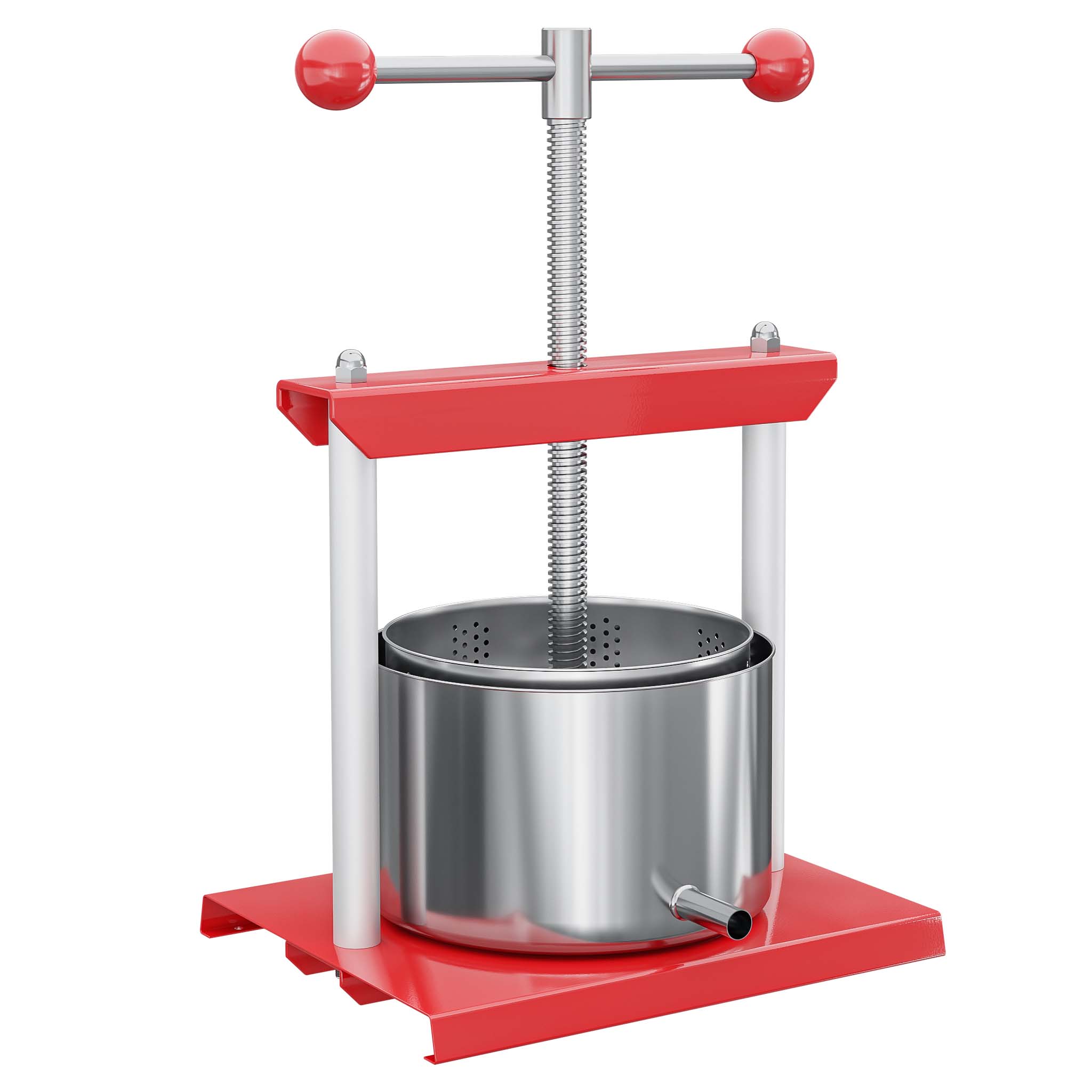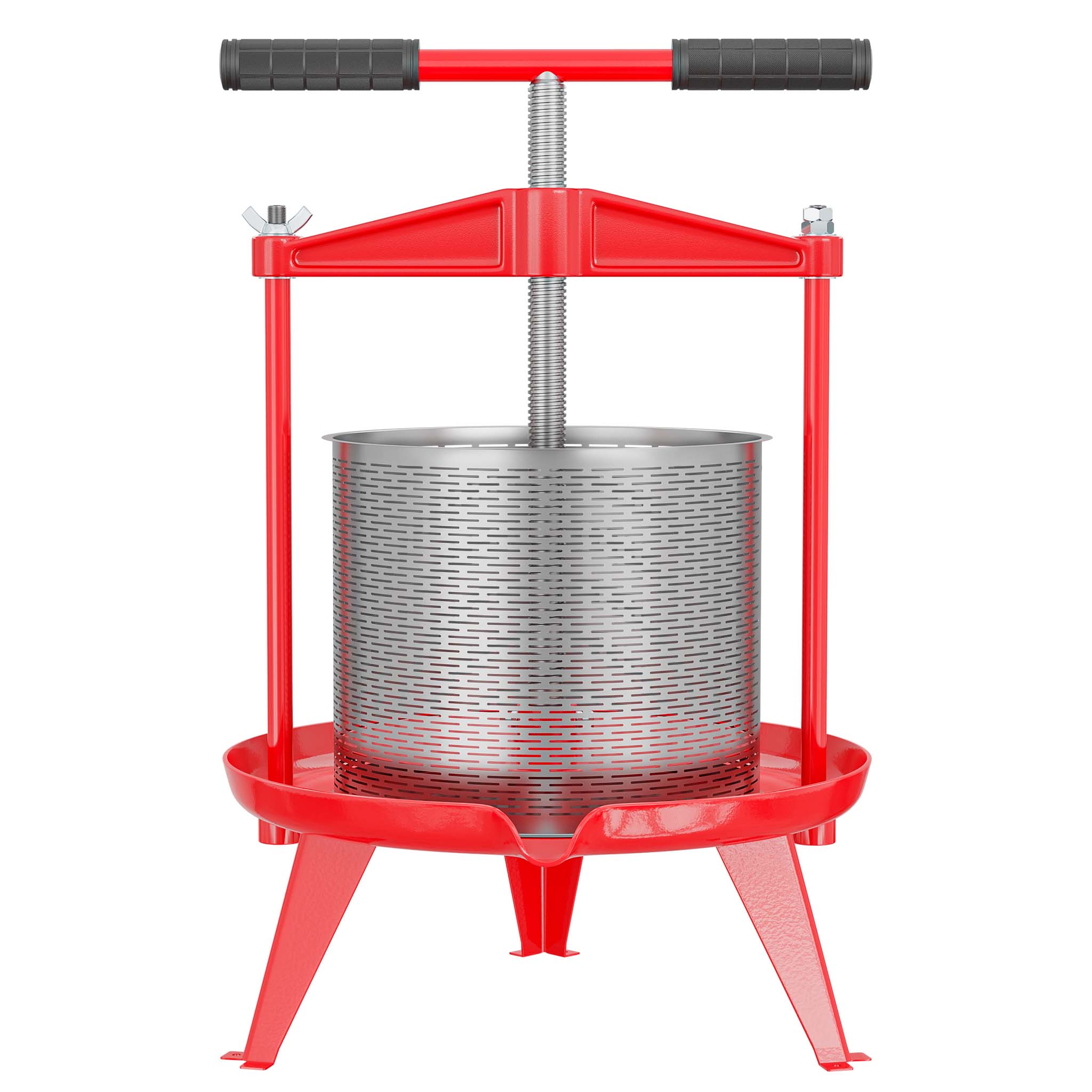Available, delivery time: 2 - 3 days
• For fruit, vegetables, herbs
• 6 l
• Basket: stainless steel
• Quickly to assemble
• Easy to clean
Available, delivery time: 2 - 3 days
• for commercial fruit presses
• washable up to 60°
Available, delivery time: 2 - 3 days
• For fruit / vegetables
• Funnel for 7 liters
• Handle
• Good yield of juice
• Easy to clean
Available, delivery time: 2 - 3 days
• 3 bar
• stainless steel
• juice pressing, quickly and easily
• high juice yield, less waste
• without electricity and without muscle power
• energy-saving, ingeniously simple drive mechanism
Available in 47 days, delivery time 2 - 3 days
• 3 bar
• stainless steel
• juice pressing, quickly and easily
• high juice yield, less waste
• without electricity and without muscle power
• energy-saving, ingeniously simple drive mechanism
Available, delivery time: 2 - 3 days
• For fruit, vegetables, herbs
• 3 l
• Basket: stainless steel
• Quickly to assemble
• Easy to clean
Available, delivery time: 2 - 3 days
• 14 liters
• Basket: stainless steel
• Manual operation
• Easy assembly & cleaning
Currently not available
• 12 liters
• Basket: wood
• Manual operation
• Easy assembly & cleaning
Obstpressen für Zuhause
Die Welt des Saftmachens hat in den eigenen vier Wänden eine spannende Renaissance erlebt – und das hat gute Gründe. Mit Apfelpressen, der Möglichkeit, eine Saftpresse zu kaufen, einer Beerenpresse oder einer Wiltec Obstpresse öffnen sich Türen zu frischen Säften und köstlichen Marmeladen, die den Geschmack von industriell gefertigten Produkten bei Weitem übertreffen.
Mit einer Apfelpresse können Sie den Geschmack von frisch gepresstem Apfelsaft genießen, der frei von künstlichen Zusatzstoffen und Konservierungsstoffen ist. Wenn Sie eine Saftpresse kaufen, ermöglicht diese Ihnen die Herstellung von individuell zubereiteten Säften aus einer Vielzahl von Früchten und Gemüsesorten. Eine Beerenpresse eröffnet Ihnen die Möglichkeit, die Aromen von Himbeeren, Erdbeeren und anderen Beeren zu erleben. Die Wiltec Obstpresse kann eine breite Palette von Obstsorten verarbeiten. So steht Ihrem selbstgemachten Saft nichts mehr im Wege.
Obstpressen für Zuhause sind nicht nur eine Möglichkeit, gesunde Getränke herzustellen, sondern auch eine unterhaltsame Aktivität für die ganze Familie.

Köstlicher Saft selbst hergestellt
Für alle, die ihren Saft selbst herstellen möchten, ist die Wahl der richtigen Saftpresse von entscheidender Bedeutung. Die Palette reicht von hydraulischen Obstpressen bis hin zu kleinen Saftpressen.
Warum sollten Sie sich für die Herstellung Ihres eigenen Saftes entscheiden?
Frischer und gesunder Saft: Selbst gepresster Saft schmeckt nicht nur besser, sondern ist auch gesünder. Sie haben die volle Kontrolle über die Zutaten und können frisches Obst Ihrer Wahl verwenden. So erhalten Sie einen Saft ohne Konservierungsstoffe oder künstliche Zusätze.
Frischer und gesunder Saft: Selbst gepresster Saft schmeckt nicht nur besser, sondern ist auch gesünder. Sie haben die volle Kontrolle über die Zutaten und können frisches Obst Ihrer Wahl verwenden. So erhalten Sie einen Saft ohne Konservierungsstoffe oder künstliche Zusätze.
Direkt gepresst und natürlich hergestellt: Selbstgepresster Saft ist so natürlich wie möglich. Die Früchte werden direkt gepresst, ohne lange Lagerung oder Verarbeitung, was den Geschmack und die Qualität des Saftes verbessert.
Verschiedene Größen: Saftpressen sind in verschiedenen Größen erhältlich, um den Bedürfnissen verschiedener Haushalte gerecht zu werden. Egal, ob Sie nur gelegentlich Saft pressen oder eine größere Menge für die Familie herstellen möchten, es gibt die passende Presse für Sie.
Funktionsweise kurz erklärt
Eine Obstpresse mit Mühle, wie die hydraulische Apfelpresse, ist ein vielseitiges Gerät, das die Herstellung von frischem Saft aus Obst spielend einfach macht. Der Aufbau einer Obstpresse umfasst in der Regel mehrere Komponenten, die zusammenarbeiten. Die Hauptbestandteile sind:

Die Mühle: Die Mühle dient dazu, das Obst zu zerkleinern und in eine grobe Masse zu verwandeln. Dieser Schritt erleichtert das Pressen des Saftes erheblich.
Die Presse: Die eigentliche Presse übt Druck auf die zerkleinerte Obstmasse aus, um den Saft herauszupressen. Bei hydraulischen Apfelpressen erfolgt dieser Druck mithilfe eines Hydraulikzylinders, der den Saft aus dem Obst extrahiert.
Im Lieferumfang enthalten ist unter anderem ein Presstuch, welches ein einfaches Entfernen der Obstreste ermöglicht. Zusätzlich zur Presse und Mühle werden ein Auffangbehälter für den gewonnenen Saft, ein Sieb, um feste Bestandteile zu trennen, und ein Trichter für das Einfüllen des Obstes, benötigt.
Die Bedienung einer solchen Obstpresse ist in der Regel recht einfach. Nachdem Sie das Obst zerkleinert haben, wird es in die Mühle gegeben. Anschließend wird die Presse aktiviert, um den Saft zu gewinnen. Der gewonnene Saft kann dann auf verschiedene Weisen weiterverarbeitet oder direkt genossen werden.
Ein großer Vorteil selbst gepressten Saftes ist, dass er bei gutem Verschluss mehrere Jahre lang haltbar ist. Dadurch können Sie Ihre Ernte nutzen und den frischen Geschmack des Obstes auch außerhalb der Saison genießen.
Für folgende Früchte geeignet
Eine Obstpresse ist ein äußerst vielseitiges Gerät, das nicht nur für die Verarbeitung von Obst, sondern auch für verschiedene andere Früchte und sogar Gemüse verwendet werden kann. Hier ist eine Liste der Früchte, die sich ideal für die Verwendung in einer Obstpresse eignen:
1. Äpfel: Äpfel sind die klassische Wahl für die Saftproduktion und werden häufig in Apfelpressen verwendet.
2. Birnen: Birnen ergeben einen milden und köstlichen Saft, der sich gut mit anderen Früchten kombinieren lässt.
3. Trauben: Traubensaft ist ein beliebtes Getränk und kann aus verschiedenen Traubensorten hergestellt werden.
4. Beeren: Himbeeren, Erdbeeren, Brombeeren und andere Beerenarten sind ideal für die Herstellung von Beerenpressen.
5. Kirschen: Kirschsaft hat einen intensiven Geschmack und kann allein oder in Mischungen verwendet werden.
6. Zitrusfrüchte: Orangen, Zitronen, Limetten und Grapefruits eignen sich hervorragend für die Herstellung von frischem Zitrusfruchtsaft.
7. Pfirsiche und Aprikosen: Diese süßen Früchte ergeben einen aromatischen Saft.

Was Gemüse betrifft, so kann eine Obstpresse auch für die Verarbeitung von bestimmten Gemüsesorten verwendet werden, insbesondere für Gurken, Tomaten und Paprika. Diese können zu köstlichen Säften oder sogar zur Herstellung von Gemüsepürees genutzt werden.
Die Vielseitigkeit einer Obstpresse eröffnet Ihnen die Möglichkeit, eine breite Palette von Säften und Pürees aus frischen, unverarbeiteten Zutaten herzustellen, ganz nach Ihrem Geschmack und Ihren Vorlieben.
Presstücher als Zubehör

Presstücher sind ein unverzichtbares Zubehör für Obstpressen, insbesondere für Modelle wie die Obstpresse 6 Liter. Sie dienen dazu, den Pressvorgang zu erleichtern und den Saft effizient von den festen Fruchtrückständen zu trennen.
Die Hauptfunktion von Presstüchern besteht darin, die zerkleinerte Obstmasse in einem sauberen und kontrollierten Prozess zu pressen. Sie werden im Inneren der Presse platziert und umschließen das Obst, während der Druck aufgebaut wird. Dies ermöglicht es, den Saft sanft aus dem Obst zu extrahieren, ohne dass Fruchtfasern oder Kerne in den Saft gelangen.
Presstücher sind in der Regel wiederverwendbar, was sie zu einer umweltfreundlichen Wahl macht. Nach dem Pressen können sie gereinigt, getrocknet und für zukünftige Pressvorgänge erneut verwendet werden..
Die richtigen Presstücher sind ein Schlüssel zur erfolgreichen Saftproduktion und tragen dazu bei, dass Sie das Beste aus Ihrer Obstpresse herausholen können.
Obst und Beerenpresse sauber halten
Die Pflege und Sauberkeit Ihrer Obst- und Beerenpresse, auch Fruchtpresse genannt, sind entscheidend, um die Qualität Ihres gepressten Saftes zu gewährleisten und die Lebensdauer Ihres Geräts zu verlängern.
Der Reinigungsprozess beginnt unmittelbar nach dem Pressen. Entfernen Sie zuerst alle Rückstände von Obst oder Beeren aus der Presse. Schütteln Sie das Gerät vorsichtig, um lose Fruchtfasern und Kerne zu lösen.
Als Nächstes zerlegen Sie die Fruchtpresse gemäß den Anweisungen des Herstellers. Dies kann das Entfernen von Sieben, Filtern und anderen Teilen umfassen. Spülen Sie diese Teile gründlich mit warmem Wasser ab, um alle Saft- und Frucht Rückstände zu entfernen.
Verwenden Sie bei Bedarf eine Bürste, um hartnäckige Ablagerungen zu lösen. Achten Sie darauf, alle Teile gründlich zu trocknen, um Rost oder Schimmelbildung zu verhindern.
Reinigen Sie auch die äußere Oberfläche der Fruchtpresse und entfernen Sie jegliche Spritzer oder Verschmutzungen. Verwenden Sie dazu ein feuchtes Tuch oder einen milden Reiniger.
Die regelmäßige Reinigung nach jedem Pressvorgang ist entscheidend, um die Hygiene und die Qualität Ihres Saftes zu gewährleisten. Mit diesen einfachen Schritten können Sie sicherstellen, dass Ihre Obst- und Beerenpresse immer einsatzbereit ist und Ihnen köstlichen, frisch gepressten Saft liefert.

Zusammenfassung
Bei der Suche nach hochwertigen Obstpressen, darunter auch hydraulische Saftpressen und kleine Obstpressen, bieten wir eine große Auswahl, die für jeden Bedarf und Geschmack etwas bereithält. Unser Sortiment umfasst zuverlässige Produkte, die online mit Leichtigkeit erworben werden können. Bei uns finden Sie Saftpressen in verschiedenen Preisklassen.
Egal, ob Sie frischen Apfelsaft mit einer Apfelpresse genießen möchten oder nach einer hydraulischen Saftpresse suchen, um große Mengen Saft zu produzieren, wir haben die richtige Lösung für Sie. Unsere kleinen Obstpressen sind ideal für den Heimgebrauch und eignen sich perfekt für Obst und Beeren.
.
Verlassen Sie sich darauf, bei uns qualitativ hochwertige Obstpressen, einschließlich hydraulischer Saftpressen und kleiner Obstpressen, zu finden, die Ihre Saftproduktion zum Vergnügen machen werden. Bei uns können Sie vertrauensvoll einkaufen und genau das richtige Produkt für Ihre Bedürfnisse finden, egal, ob Sie ein erfahrener Saftmacher sind oder gerade erst in die Welt des Saftpressens eintauchen.


